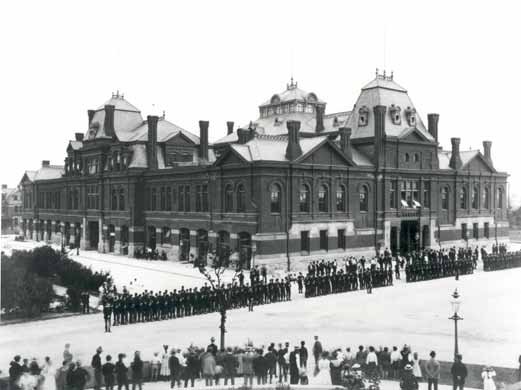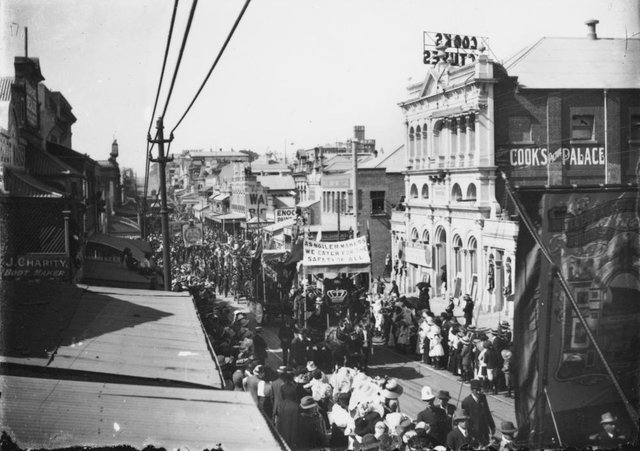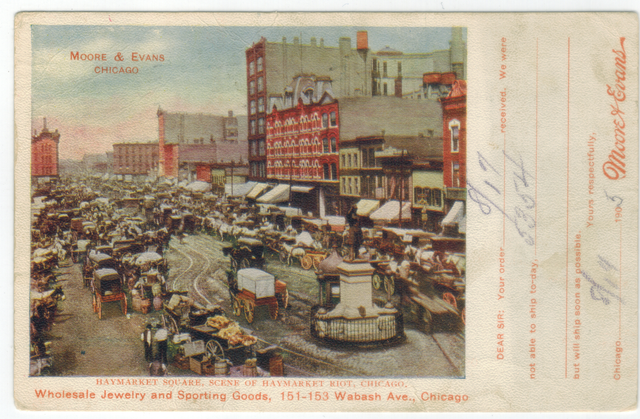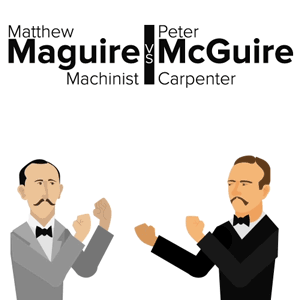The Bloody History of Labor Day
Labor Day has a bloody history, and I’m not just referring to the slaughtered animals grilled and served up at barbecues at Labor Day picnics. The holiday was a hard-won concession labor unions got out of the government after many decades of struggle, including the use of deadly force by the U.S. Army to peaceful demonstrations like the Pullman Strike in 1894.

Before that was the 1886 Haymarket Affair, a demonstration at which an unknown person threw a bomb at police, who responded by indiscriminately firing, killing protesters and fellow police officers alike.
The unofficial holiday originated in 1882, when labor union activists first claimed the day as a holiday for workers and urged union members to refuse to go to work that day and parade in the streets instead.

The Lives of Industrial Workers
In the 1880s, the height of the Industrial Revolution in the US, work days could be 12 or 16 hours long and work weeks six or seven days long. Children were often employed in dangerous work and in some industries, people were lucky to live to the age of 25.
In his 1906 book The Jungle, Upton Sinclair tried to call attention to the gruesome conditions of factory workers. Although some of the worst conditions he described had already been remedied by the time his book was published, he hoped to raise awareness of long hours, unsanitary conditions, and worker safety issues. He paints a chilling scene in which a man fell into a meat processing vat, and to compensate his family, the factory owner gave his wife a large portion of processed meat for free – from the batch her husband fell into.

Sinclair later noted bitterly that he had written a book hoping to get better conditions for workers, but instead got only food safety laws to protect consumers from the unsanitary conditions in which their food was processed.
The US Dept. of Labor: The Struggle is Over Who Came Up With the Idea First
You would never have any inkling of the history behind the holiday from reading the account of it on the US Department of Labor website.
According to them, Labor Day
is dedicated to the social and economic achievements of American workers... The vital force of labor added materially to the highest standard of living and the greatest production the world has ever known and has brought us closer to the realization of our traditional ideals of economic and political democracy. It is appropriate, therefore, that the nation pay tribute on Labor Day to the creator of so much of the nation's strength, freedom, and leadership — the American worker.
Their page goes on to give a bland account of the legislative history, and draws the reader’s attention to the fight over which person first came up with the idea to establish the Labor Day holiday. The main image on the page is this huge animated gif.
The page mentions that the day was proposed as a holiday by labor unions, but doesn’t mention that it began as a day that workers gave to themselves by refusing to go to work that day, and it gives none of the history of the struggle of the workers before municipal, state, and finally the federal government were forced to acknowledge it as an official holiday.
The Struggle to Realize “the abstract right of free labor won at Appomattox"
In her book, The Making of American Exceptionalism: The Knights of Labor and Class Formation in the Nineteenth Century, sociologist Kim Voss describes the holiday as a hard-won victory of “a national labor movement [that] had been built from the bottom up” (78) which stressed the ideals of “cooperation and mutualism” (80) and became increasingly anti-employer. At first, labor unions welcomed small business owners who represented to them the fulfilment of the American Dream, as well as larger employers they deemed worker-friendly, but relations became increasingly antagonistic. (210-211)
Voss writes that the establishment of the Labor Day holiday arose out of
the long struggle of labor unions starting in the 1830s but especially after the end of the US Civil War, to campaign for distinctly working-class legislation--factory regulation, mine laws, and especially the eight-hour day. They argued that such laws were necessary if the abstract right of free labor, won at Appomattox, was to have any real meaning. This line of argumentation soon drew them headlong into a national debate over what egalitarian ideals and republican traditions meant in post-civil War America. (73)
Appomattox marked the end of the US Civil War in 1865.
Union organizing became particularly strong in the 1880s. There was a huge backlash against protesters and strikers in 1885 and 1886 as papers like The New York Times as well as popular magazines and even law journals began to call the union activists un-American, lawless, and “common ruffians.” (77)
There was a general strike on May 1, 1886, to call for an eight-hour work day. The Haymarket Affair, which led to establishment of International Workers Day, came three days later. On May 4, 1886, protesters in Chicago demanded an eight-hour workday. Police were present though the demonstration was peaceful until an unknown person threw a bomb at the police.
The police responded by opening fire and killing several protesters as well as several police officers. The event further fueled fears that labor activists were radical and violent, and led to a greater backlash. Four activists were hanged, despite no evidence of their involvement with the bomb or any other violent activity. Four others were later pardoned by the governor, who was appalled by the judge’s rulings.

After the Haymarket Affair, May 1st was declared International Workers Day, where it is observed officially or unofficially around the world as a day to honor workers.
In the U.S., workers won the struggle for the eight-hour workday in pieces between the 1890s and 1930s.
The Government Overreaction to the Pullman Strike Forces President Cleveland’s Hand
The Pullman strike of 1994 occurred after Pullman railway workers were forced to take pay cuts while continuing to pay the same rent in Pullman tenements, rents that were already higher than in surrounding areas. When workers struck, Pullman shut down his factory and laid off the workers who were not striking, leading to great unrest in Chicago, and the striking of railway workers that over several months spread to 27 states.
The disruption caused by this led the initially sympathetic public to turn against the strikers as farmers and many industries were negatively affected, with some people calling it a great rebellion.
Grover Cleveland declared the strike a crime, and Congress approved sending the United States Army and the US Marshals to Chicago, where they killed several protesters.
According to Wikipedia, in the wake of the killings:
the United States Congress unanimously voted to approve legislation to make Labor Day a national holiday and President Grover Cleveland signed it into law six days after the end of the strike. Cleveland supported the creation of the national holiday in an attempt to shore up support among trade unions following the Pullman Strike.
Wikipedia states that May 1, International Workers Day, was considered as a possible date for the holiday, but that
President Cleveland was concerned that observance of Labor Day on May 1 would encourage Haymarket-style protests and would strengthen socialist and anarchist movements.
While May 1, International Workers Day, represents the struggle of workers for an eight-hour work day and better working conditions, Labor Day was a day declared by labor union activists to celebrate workers, marked by parades in many cities. Like the eight-hour work day, union activists first claimed the Labor Day holiday and established it before it became officially recognized. Although both days arose out of the struggles of labor union activists and both are days meant to honor workers, May 1st still represents the struggle whereas Labor Day represents a celebration of workers, which makes it convenient to acknowledge it without reference the bloody history behind it.

thank @goose you for linking back to my post|
yeah haymarket affair is a really important event, now we can enjoy 8 hours working in one day
thanks , useful article . people need to know